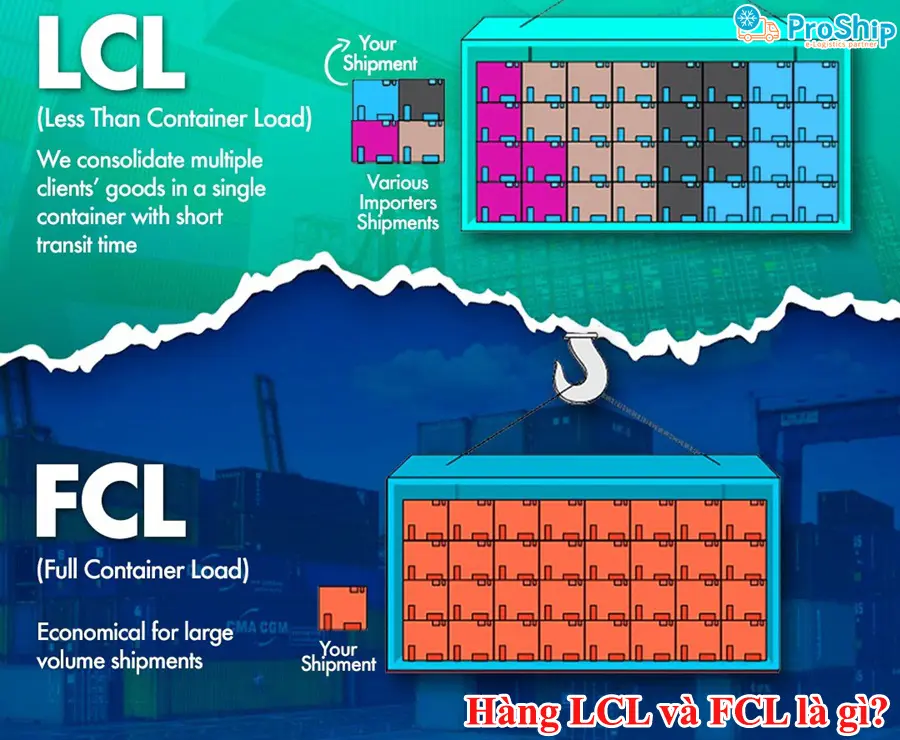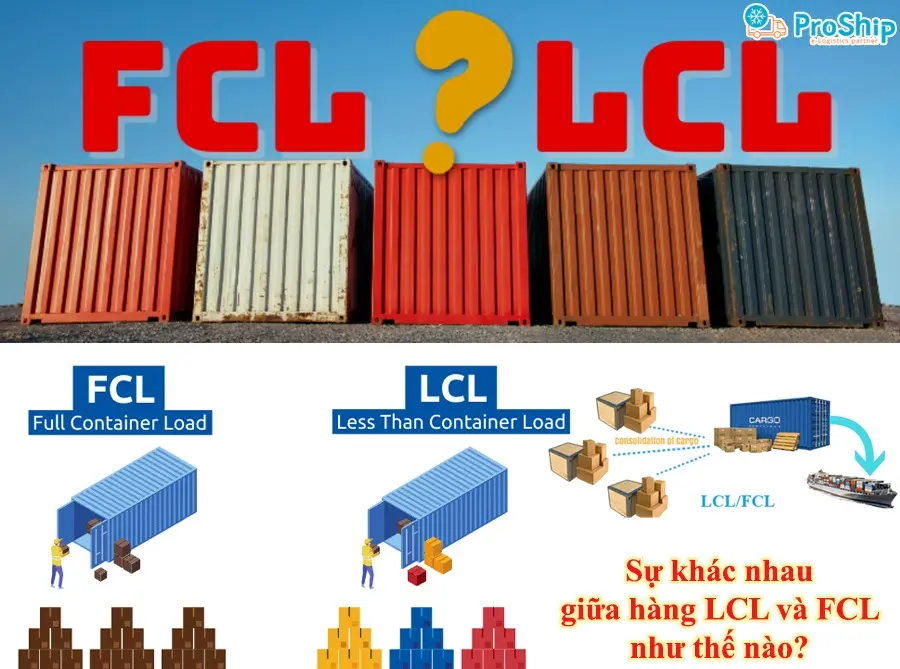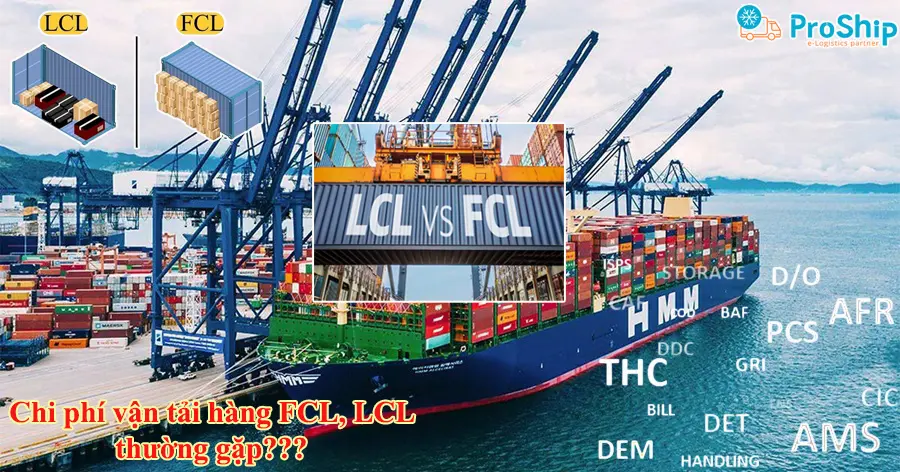x Bạn có lô hàng vận chuyển đường biển cần tìm hiểu khái niệm FCL và LCL là hàng gì?
x Bạn muốn biết hàng LCL và FCL có gì khác nhau? Ưu nhược điểm FCL và LCL là gì?
x Bạn quan tâm tới các chi phí vận chuyển hàng nguyên FCL và hàng lẻ LCL hiện nay?
Mọi thắc mắc đặt ra về hàng LCL là gì, hàng FCL là gì sẽ được Proship.vn giải đáp một cách cặn kẽ chi tiết, đồng thời chúng tôi cũng so sánh về mức độ khác nhau giữa hàng lẻ LCL và hàng nguyên FCL trong vận chuyển đường biển cho các chủ hàng nắm rõ.
Hàng FCL, LCL là gì?
FCL là gì?
Hàng FCL là gì? FCL (Full Container Load) là hàng nguyên container. Là hình thức mà người gửi hàng có đủ khối lượng hàng đồng nhất để chất đầy một hoặc nhiều container để vận chuyển. Người gửi hàng có trách nhiệm đóng hàng và người nhận hàng có trách nhiệm dỡ hàng khỏi container.

LCL là gì?
Hàng LCL là gì? LCL (Less-than-container load) là những lô hàng lẻ từ nhiều chủ hàng khác nhau để ghép đủ một container hàng hóa. Đây là cách thức vận chuyển hàng hóa khi chủ hàng không đủ hàng để đóng nguyên một container, mà cần ghép chung với một số lô của chủ hàng khác.
Vậy nên, các Công ty dịch vụ logistics sẽ tiến hành gom hàng (Consolidation), là kết hợp nhiều lô hàng lẻ (LCL shipments) từ nhiều chủ hàng để đóng chung vào container, sau đó thu xếp để vận chuyển.
Sự khác nhau của hàng LCL và FCL ra sao?
Khái niệm hàng LCL là gì, hàng FCL là gì đã được giải đáp. Tiếp theo, nhiều thắc mắc cũng đặt ra là giữa LCL và FCL có gì khác nhau? Hàng FCL và LCL có nhiều điểm khác nhau phải kể đến như:
| FCL | LCL | |
| Tên viết tắt | Full Container Load: Hàng nguyên cont. | Less than Container Load: Một phần của cont hay hàng đóng ghép. |
| Chi phí |
|
|
| Kích thước hàng | Ngoài việc một chủ hàng có nhiều thùng hàng đủ chứa một cont, thì thường loại hàng hóa phù hợp với FCL là cồng kềnh và nặng. | Hàng LCL thường nhỏ và dễ di chuyển hơn. |
| Tỷ giá | Tỷ giá FCL dễ biến động. | Tỷ giá LCL ổn định hơn. |
| Điều kiện vận chuyển | Để vận chuyển hàng FCL, người gửi hàng sẽ phải đặt trước ít nhất một nguyên container. | Đối với một lô hàng LCL, không cần thiết phải đặt một container; chỉ một phần của nó cần phải được đặt trước. |
| Chủ hàng | Thuộc một chủ hàng. | Thuộc nhiều chủ hàng khác nhau. |
| Thời gian giao hàng | Nhanh hơn vì chỉ giao một chủ hàng. Toàn bộ container đã được đặt trước, không cần phải phân loại và đóng gói container tại các cảng giao hàng riêng biệt. Khả năng xảy ra chậm trễ tại cảng và do cơ quan hải quan quản lý cũng thấp hơn. | Chậm hơn vì phải giao nhiều chủ hàng. Ngoài ra, cần thêm thời gian để phân loại hàng hóa, tổng hợp chứng từ và xử lý. Thời gian cần thiết trong việc xếp và dỡ hàng cũng có thể cao hơn trong trường hợp gửi hàng LCL. |

Ưu nhược điểm hàng LCL và hàng FCL là gì?
Bạn đã biết LCL và FCL có gì khác nhau thì cũng cần biết ưu nhược điểm của hàng LCL là gì, hàng FCL là gì:
Đối với hàng LCL
Ưu nhược điểm của hàng lẻ LCL:
Ưu điểm hàng LCL:
- Chi phí và quản lý hàng tồn kho ít hơn so với FCL;
- Là chọn lựa phù hợp khi vận chuyển hàng tải trọng nhỏ.
Nhược điểm hàng LCL:
- Thời gian vận chuyển lâu hơn;
- Khả năng hư hỏng cao hơn;
- Có thể phát sinh sự chậm trễ trong việc giao hàng.
Đối với hàng FCL
Ưu nhược điểm của hàng nguyên cont FCL:
Ưu điểm hàng FCL:
- Ít khả năng hư hỏng hơn;
- Thời gian vận chuyển nhanh hơn;
- Lựa chọn phù hợp khi vận chuyển số lượng lớn hàng hóa, hàng lớn cồng kềnh,…
Nhược điểm hàng FCL:
- Tốn nhiều chi phí khi hàng hóa nhỏ lẻ;
- Chi phí hàng tồn kho cao hơn;
- Việc dỡ hàng phức tạp.
Nói chung, tùy vào nhiều điều kiện và mục đích của Nhà xuất nhập khẩu, bao gồm nguồn cung hàng hóa, quy mô vốn và lượng cầu của người nhận hàng, hoặc đặc điểm của các mặt hàng mà quyết định lựa chọn giữa phương thức vận chuyển FCL hay LCL đường biển.
Liệt kê các chi phí vận tải hàng FCL và LCL
Các chi phí vận chuyển hàng nguyên FCL và hàng lẻ LCL thường gặp như:
- Phí BAF (Bunker Adjustment Factor):
Là khoản phụ phí (ngoài cước biển) hãng tàu thu từ chủ hàng để bù đắp chi phí phát sinh do biến động giá nhiên liệu. Tương đương với thuật ngữ FAF (Fuel Adjustment Factor).
- Phí CLEANING FEE:
Là phí vệ sinh cont trả cho hãng tàu để làm vệ sinh vỏ container rỗng sau khi người nhập khẩu lấy container về kho và trả cont rỗng tại các depot (dành cho hàng FCL).
- Phí CFS (Container freight Station):
Là phí cho một lô hàng lẻ xuất/nhập khẩu , các công ty Forwarder (master consol) phải dỡ hàng hóa từ container đưa vào kho hoặc ngược lại và họ thu phí CFS (chỉ dành cho hàng LCL).
- Phí D/O fee (Delivery Order fee):
Là phí lệnh giao hàng, là chứng từ do hãng tàu phát hành dùng để nhận hàng mà doanh nghiệp nhập khẩu nhận được để trình cho cơ quan giám sát kho hàng (cảng đến) trước khi có thể rút hàng ra khỏi container, kho, bãi,… Để lấy được hàng, consignee bắt buộc phải có chứng từ này.
- Phí O/F (Ocean Freight):
Là chi phí vận tải đơn thuần từ cảng đi đến cảng đích hay còn được gọi là cước đường biển.

- Phí PSS (Peak Season Surcharge):
Là phụ phí mùa cao điểm, phụ phí này thường được các hãng tàu áp dụng trong mùa cao điểm từ tháng tám đến tháng mười, khi có sự tăng mạnh về nhu cầu vận chuyển hàng hóa thành phẩm để chuẩn bị hàng cho mùa Giáng sinh và Ngày lễ tạ ơn tại thị trường Mỹ và châu Âu.
- Phí EBS (Emergency Bunker Surcharge):
Là phụ phí xăng dầu cho các tuyến hàng đi châu Á. Phụ phí này bù đắp chi phí “hao hụt” do sự biến động giá xăng dầu trên thế giới cho hãng tàu. Phí EBS là một loại phụ phí vận tải biển, phí EBS không phải phí được tính trong Local Charge.
- Phí THC (Terminal Handling Charge):
Là phụ phí xếp dỡ tại cảng là khoản phí thu trên mỗi container để bù đắp chi phí cho các hoạt động làm hàng tại cảng như: xếp/dỡ, tập kết container từ CY ra cầu tàu,…Đây thực chất là phí do cảng quy định, các hãng tàu chi hộ và sau đó thu lại từ chủ hàng (người gửi và người nhận hàng).
- Phí Handling (Handling fee):
Là phí xử lý hàng hóa do forwarder thu nhằm bù đắp chi phí khi thực hiện lô hàng (chỉ dành cho hàng LCL).
Proship Logistics đã giải đáp hàng LCL là gì, hàng FCL là gì, LCL và FCL có gì khác nhau cũng như ưu nhược điểm của hai loại hàng này là gì để chủ hàng, doanh nghiệp cân nhắc chọn phương thức gửi hàng phù hợp, tiết kiệm. Mọi thắc mắc về hàng lẻ và hàng nguyên container, liên hệ ngay 0909 344 247 để được giải đáp và tư vấn Dịch vụ vận tải biển Nội địa, Quốc tế giá tốt nhất.
